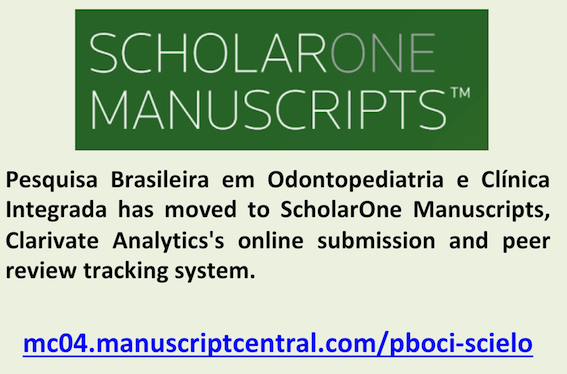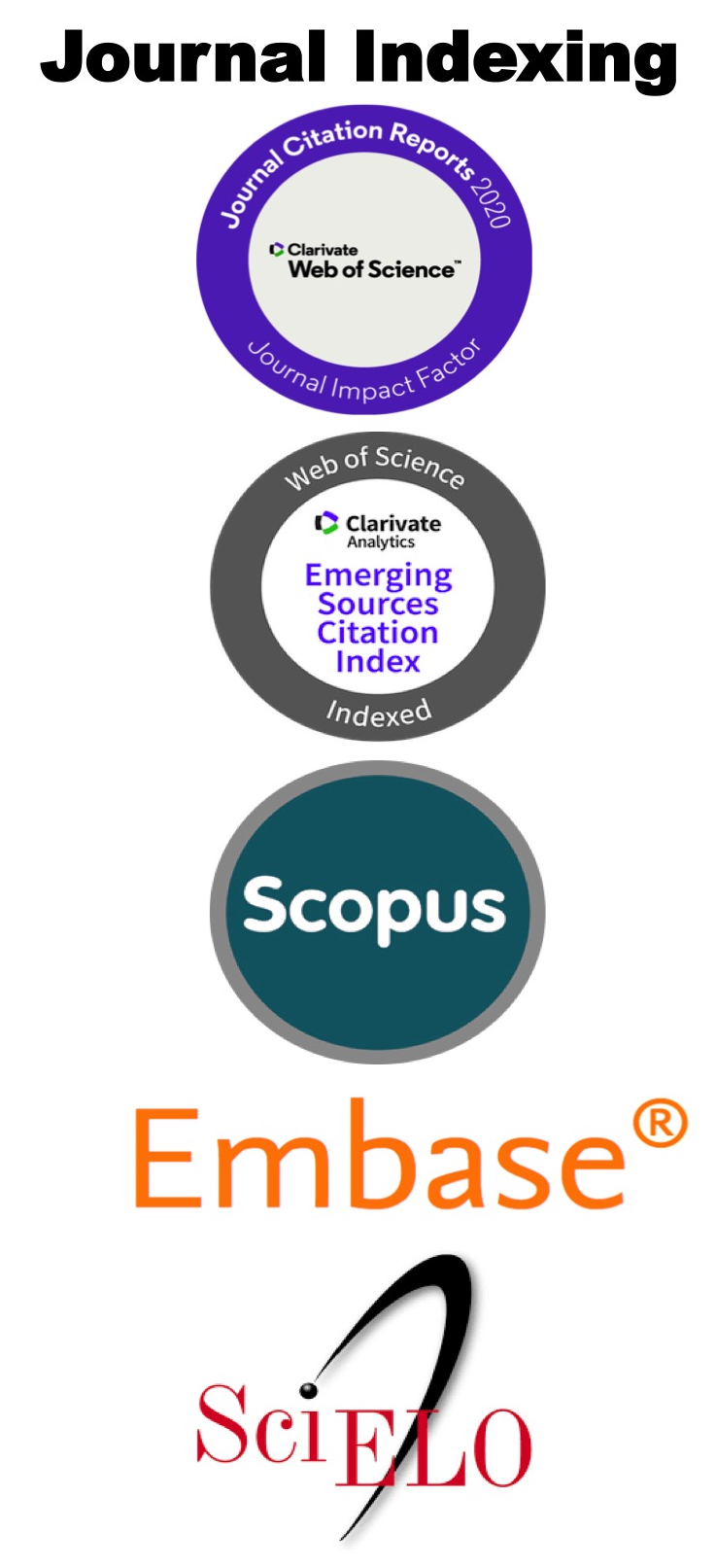Effect of Xylitol Varnishes on the Inhibition of Demineralization in Vitro
Keywords:
Dental Caries, Tooth Demineralization, XylitolAbstract
Objective: To evaluate the efficacy of xylitol varnishes in the inhibition of enamel demineralization in vitro. Material and Methods: Bovine enamel blocks (n=120) were randomly allocated to four groups (n = 30), and the surface hardness (SH) was measured at baseline. The blocks were treated with the following varnishes: 20% xylitol, 20% xylitol plus F (5% NaF), Duraphat™ (5% NaF, positive control), and placebo (no-F/xylitol, negative control). The varnishes were applied and removed after 6 h of immersion in artificial saliva. The blocks were subjected to pH cycles (demineralization and remineralization for 2 and 22h/day, respectively, for 8 days). Surface and cross-sectional hardnesses were measured to calculate the percentage of SH loss (%SHL) and the integrated loss of the subsurface hardness (ΔKHN). Data were statistically analyzed using Kruskal-Wallis and Tukey’s tests (p<0.05). Results: %SHL was significantly decreased by 20% xylitol plus F, Duraphat™, and 20% xylitol varnishes compared to placebo. The use of 20% xylitol plus F varnish led to a significantly lower percentage of SH loss compared to the use of 20% xylitol varnish without F. However, the experimental and commercial varnishes led to significantly lower subsurface demineralization compared to placebo and did not differ from each other. Conclusion: Xylitol varnishes, especially when combined with F, effectively prevent enamel demineralization.References
Deshpande A, Jadad AR. The impact of polyol-containing chewing gums on dental caries: a systematic review of original randomized controlled trials and observational studies. J Am Dent Assoc 2008; 139(12):1602-14. https://doi.org/10.14219/jada.archive.2008.0102
Mäkinen KK. An end to crossover designs for studies on the effect of sugar substitutes on caries? Caries Res 2009; 43(5):331-3. https://doi.org/10.1159/000231568
Milgrom P, Ly KA, Rothen M. Xylitol and its vehicles for public health needs. Adv Dent Res 2009; 21(1):44-7. https://doi.org/10.1177/0895937409335623
Riley P, Moore D, Ahmed F, Sharif MO, Worthington HV. Xylitol-containing products for preventing dental caries in children and adults. Cochrane Database Syst Rev 2015; 26(3):CD010743. https://doi.org/10.1002/25809586.CD010743.pub
Janakiram C, Deepan Kumar CV, Joseph J. Xylitol in preventing dental caries: A systematic review and meta-analyses. J Nat Sci Biol Med 2017; 8(1):16-21. https://doi.org/10.4103/0976-9668.198344
Stecksén-Blicks C, Holgerson PL, Olsson M, Bylund B, Sjöström I, Sköld-Larsson K, et al. Effect of xylitol on mutans streptococci and lactic acid formation in saliva and plaque from adolescents and young adults with fixed orthodontic appliances. Eur J Oral Sci 2004; 112(3):244-8. https://doi.org/10.1111/j.1600-0722.2004.00130.x
Thaweboon S, Thaweboon B, Soo-Ampon S. The effect of xylitol chewing gum on mutans streptococci in saliva and dental plaque. Southeast Asian J Trop Med Public Health 2004; 35(4):1024-7.
Thorild I, Lindau B, Twetman S. Salivary mutans streptococci and dental caries in three-year-old children after maternal exposure to chewing gums containing combinations of xylitol, sorbitol, chlorhexidine, and fluoride. Acta Odontol Scand 2004; 62(5):245-50. https://doi.org/10.1080/00016350410001676
Mickenautsch S, Yengopal V. Anticariogenic effect of xylitol versus fluoride — a quantitative systematic review of clinical trials. Int Dent J 2012; 62(1):6-20. https://doi.org/10.1111/j.1875-595X.2011.00086.x
Takahashi N, Washio J. Metabolomic effects of xylitol and fluoride on plaque biofilm in vivo. J Dent Res 2011; 90(12):1463-8. https://doi.org/10.1177/0022034511423395
Cardoso CA, Cassiano LP, Costa EN, Souza-E-Silva CM, Magalhães AC, Grizzo LT, et al. Effect of xylitol varnishes on remineralization of artificial enamel caries lesions in situ. J Dent 2016; 50:74-8. https://doi.org/10.1016/j.jdent.2016.03.011
Cardoso CA, de Castilho AR, Salomão PM, Costa EN, Magalhães AC, Buzalaf MA. Effect of xylitol varnishes on remineralization of artificial enamel caries lesions in vitro. J Dent 2014; 42(11):1495-1501. https://doi.org/10.1016/j.jdent.2014.08.009
Miake Y, Saeki Y, Takahashi M, Yanagisawa T. Remineralization effects of xylitol on demineralized enamel. J Electron Microsc (Tokyo) 2003; 52(5):471-6. https://doi.org/10.4103/njcp.njcp_188_19
Scheinin A, Mäkinen KK. The effect of various sugars on the formation and chemical composition of dental plaque. Int Dent J 1971; 21(3):302-21.
Quirynen M, Marechal M, Busscher HJ, Weerkamp AH, Arends J, Darius PL, et al. The influence of surface free-energy on planimetric plaque growth in man. J Dent Res 1989; 68(5):796-9. https://doi.org/10.1177/00220345890680050801
Trahan L. Xylitol: a review of its action on mutans streptococci and dental plaque—its clinical significance. Int Dent J 1995; 45(1 Suppl 1):77-92.
Nayak PA, Nayak UA, Khandelwal V. The effect of xylitol on dental caries and oral flora. Clin Cosmet Investig Dent 2014; 6:89-94. https://doi.org/10.2147/CCIDE.S55761
Zarif Najafi H, Shavakhi M, Pakshir HR. Evaluation of the preventive effect of two concentrations of xylitol varnish versus fluoride varnish on enamel demineralization around orthodontic brackets: a randomized controlled trial. Eur J Orthod 2021; cjab049. https://doi.org/10.1093/ejo/cjab049
Klimek J, Hellwig E, Ahrens G. Fluoride taken up by plaque, by the underlying enamel and by clean enamel from three fluoride compounds in vitro. Caries Res 1982; 16(2):156-61. https://doi.org/10.1159/000260592
Magalhães AC, Comar LP, Rios D, Delbem AC, Buzalaf MA. Effect of a 4% titanium tetrafluoride (TiF4) varnish on demineralisation and remineralisation of bovine enamel in vitro. J Dent 2008; 36(2):158-62. https://doi.org/10.1016/j.jdent.2007.12.001
Delbem AC, Bergamaschi M, Sassaki KT, Cunha RF. Effect of fluoridated varnish and silver diamine fluoride solution on enamel demineralization: pH-cycling study. J Appl Oral Sci 2006; 14(2):88-92. https://doi.org/10.1590/s1678-77572006000200005
Queiroz CS, Hara AT, Paes Leme AF, Cury JA. pH-cycling models to evaluate the effect of low fluoride dentifrice on enamel de- and remineralization. Braz Dent J 2008; 19(1):21-7. https://doi.org/10.1590/s0103-64402008000100004
Featherstone JD, ten Cate JM, Shariati M, Arends J. Comparison of artificial caries-like lesions by quantitative microradiography and microhardness profiles. Caries Res 1983; 17(5):385-91. https://doi.org/10.1159/000260692
Pereira Ade F, Silva TC, Silva TL, Caldana Mde L, Bastos JR, Buzalaf MA. Xylitol concentrations in artificial saliva after application of different xylitol dental varnishes. J Appl Oral Sci 2012; 20(2):146-50. https://doi.org/10.1590/s1678-77572012000200004
Lippert F, Lynch RJ. Comparison of Knoop and Vickers surface microhardness and transverse microradiography for the study of early caries lesion formation in human and bovine enamel. Arch Oral Biol 2014; 59(7):704-10. https://doi.org/10.1016/j.archoralbio.2014.04.005
Magalhães AC, Moron BM, Comar LP, Wiegand A, Buchalla W, Buzalaf MA. Comparison of cross-sectional hardness and transverse microradiography of artificial carious enamel lesions induced by different demineralising solutions and gels. Caries Res 2009; 43(6):474-83. https://doi.org/10.1159/000264685
de Marsillac Mde W, Vieira Rde S. Assessment of artificial caries lesions through scanning electron microscopy and cross-sectional microhardness test. Indian J Dent Res 2013; 24(2):249-54. https://doi.org/10.4103/0970-9290.116699
Marinho VC, Worthington HV, Walsh T, Clarkson JE. Fluoride varnishes for preventing dental caries in children and adolescents. Cochrane Database Syst Rev 2013; 11(7):CD002279. https://doi.org/10.1002/23846772.CD002279.pub
Sicca C, Bobbio E, Quartuccio N, Nicolò G, Cistaro A. Prevention of dental caries: a review of effective treatments. J Clin Exp Dent 2016; 8(5):e604-e610. https://doi.org/10.4317/jced.52890
Downloads
Published
How to Cite
Issue
Section
License
Copyright (c) 2022 Pesquisa Brasileira em Odontopediatria e Clínica Integrada

This work is licensed under a Creative Commons Attribution-NonCommercial 4.0 International License.



